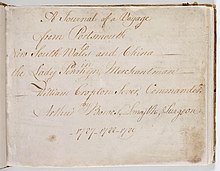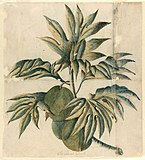Arthur Bowes Smyth
Arthur Bowes Smyth | |
|---|---|
 Arthur Bowes Smyth - Title page of his journal | |
| Born | 23 August 1750 Tolleshunt D'Arcy, Essex, England |
| Died | 31 March 1790 (aged 39) Tolleshunt D'Arcy, Essex, England |
| Occupation | Surgeon |
| Known for | Surgeon on Lady Penrhyn, diarist and natural history artist |
| Parent(s) | Thomas Smyth (surgeon) and Mary Smyth |
Arthur Bowes Smyth (23 August 1750 – 31 March 1790) was a naval officer and surgeon on the First Fleet that established the colony of New South Wales. Smyth kept a diary and documented the natural history he encountered in Australia.
Early life and medical career
Arthur Bowes Smyth was born on 23 August 1750 at Tolleshunt D'Arcy, Essex, England, and was buried there shortly after his return to England on 31 March 1790.[1][2][3] Son of Surgeon Thomas Smyth and the seventh of ten children, Arthur Bowes Smyth followed in his father's footsteps practising medicine in his place of birth until appointed "Surgeon to the Ship's Company" aboard the Lady Penrhyn in 1787.[3][4]
Whilst Bowes Smyth practiced as a surgeon for a number of years before his appointment to the First Fleet, no evidence can be found of his medical qualifications. It has been surmised that "Surgeon" was an honorary title. He is known to have practiced midwifery in his local parish of Tolleshunt D'Arcy, Essex, an experience that served him well in his supervision of the women convicts on the Lady Penrhyn.[4]
First Fleet Journal as Surgeon on the Lady Penrhyn
Bowes Smyth boarded Lady Penrhyn on 22 March 1787 before the ship departed Portsmouth for New South Wales.[5] Bowes Smyth took charge of the female prisoners on the Lady Penrhyn when the convicts' surgeon, John Turnpenny Altree, fell ill at Tenerife and, in Governor Arthur Phillip's opinion, had proved unequal to the task.[3][6][7][8] Bowes, as he was known in the colony, kept a journal from 22 March 1787 to 12 August 1789.[3] The journal is a detailed account of the voyage, recording weather observations, events on board, treatment of the sick and descriptions of ports of call en route—in particular, Rio de Janeiro and Cape Town.[4] His journal is notable for its interest in natural history including descriptions of bird life at Port Jackson and Lord Howe Island on the Lady Penrhyn's return voyage.[2][3] The journal contains 25 drawings in watercolour and ink, including the earliest known surviving illustration of the emu by a European.[1] These elements provide a unique account different from the other First Fleet Journals. Bowes Smyth's journal is one of the most detailed eyewitness accounts of the first weeks of European settlement of Australia.[9] The journal entries for 18–26 January record first impressions on arrival including interactions with Aboriginal communities and descriptions of the vegetation, intense heat, and native wildlife.[1][2]
The convicts and their children who disembarked the Lady Penrhyn at Port Jackson are listed.[1] Bowes Smyth's first journal entry, dated 22 March 1787, records the full crew list and the women convicts, their name, age, trade, crime, and term of transportation. The list of children born on the voyage contains inaccuracies regarding the sex of the child and dates of birth and death.[5] The Lady Penrhyn, under charter to the British East India Company to continue her voyage to China for a cargo of tea, departed Port Jackson in early May. The journal continues, recording the return voyage via Lord Howe Island, Tahiti, China, St Helena, and finally England.[10]
The original journal is now in the collection of the National Library of Australia and has been digitised for online viewing.[11] Manuscript 'fair copies' are held in the British Library and State Library of New South Wales. The 24 illustrations in the copy held by the State Library of New South Wales have been separated from the original journal and digitised for online viewing. The full text from the manuscript has also been digitised for online viewing.[12] The Journal was first published in 1979 by the Australian Documents Library[13]
-
Grass tree, or `A View of the Tree at Botany Bay, wh yields ye Yellow Balsam, & of a Wigwan
-
Drawing of an emu
-
Representation of a Bird of the Coot kind, found at Lord Howe Island
-
The Bread Fruit
See also
References
- ^ a b c d "Arthur Bowes-Smyth, illustrated journal, 1787–1789. Titled 'A Journal of a Voyage from Portsmouth to New South Wales and China in the Lady Penrhyn, Merchantman William Cropton Sever, Commander by Arthur Bowes-Smyth, Surgeon – 1787-1788-1789'; being a fair copy compiled ca 1790". catalogue. State Library of New South Wales. Retrieved 1 April 2014.
- ^ a b c "Arthur Bowes Smyth (1750–1790)". Discover Collections. State Library of New South Wales. Archived from the original on 23 June 2014. Retrieved 1 April 2014.
- ^ a b c d e "Smyth, Arthur Bowes (1750–1790)". Australian Dictionary of Biography. Australian National University. Retrieved 1 April 2014.
- ^ a b c "The journal of Arthur Bowes Smyth : surgeon, Lady Penrhyn, 1787–1789". State Library Catalogue. Retrieved 2 April 2014.
- ^ a b Gillen, Mollie; Browning, Yvonne; Flynn, Michael C; Library of Australian History; Gillen, Mollie (1989), The founders of Australia: a biographical dictionary of the First Fleet, Library of Australian History, p. 42, ISBN 978-0-908120-69-7
- ^ Bateson, Charles; Library of Australian History (1983), The convict ships, 1787–1868 (Australian ed.), Library of Australian History, p. 38, ISBN 978-0-908120-51-2
- ^ "The convict ships, 1787–1868". State Library Catalogue. Retrieved 2 April 2014.
- ^ Historical records of New South Wales v.1, pt. 2. Phillip, 1783–1792. Charles Potter, Government Printer. 1892–1901. p. 120.
- ^ Smyth, Arthur Bowes (1964), Original daily journal kept on the transport "Lady Penrhyn": containing one of the most detailed accounts of the first hundred days of settlement of Australia in 1788, F. Edwards
- ^ Historical records of New South Wales v.1, pt. 2. Phillip, 1783–1792. Charles Potter, Government Printer. 1892–1901. pp. 126, 136.
- ^ Williams, Nat (16 April 2014). "The Bowes Smyth First Fleet journal". Treasures Blog. National Library of Australia. Retrieved 16 April 2014.
- ^ Arthur Bowes-Smyth, illustrated journal, 1787-1789. Titled `A Journal of a Voyage from Portsmouth to New South Wales and China in the Lady Penrhyn, Merchantman William Cropton Sever, Commander by Arthur Bowes-Smyth, Surgeon - 1787-1788-1789'; being a fair copy compiled ca 1790, and pen and ink (disbound), held by State Library of New South Wales, Safe 1/15.
- ^ Smyth, Arthur Bowes; Fidlon, Paul G (1979), Ryan, R J (ed.), The journal of Arthur Bowes Smyth : surgeon, Lady Penrhyn, 1787–1789, Australian Documents Library, ISBN 978-0-908219-00-1
Further reading
- Bateson, Charles (1983). The convict ships, 1787-1868. Library of Australian History. ISBN 0908120516.
- Egan, Jack (1999). Buried alive : Sydney 1788–1792: eyewitness accounts of the making of a nation. Allen & Unwin. ISBN 9781865081380.
- Fidlion & Ryan, Paul G. & B.A. (1979). The journal of Arthur Bowes Smyth: surgeon, Lady Penrhyn, 1787-1789. Australian Documents Library. ISBN 0908219008.
- Historical records of New South Wales v.1, pt. 2. Phillip, 1783-1792 (1892-1901). NSW Government Printer.
External links
- A Journal of a Voyage from Portsmouth to New South Wales and China – in the Lady Penrhyn, Merchantman – William Cropton Sever, Commander by Arthur Bowes, Smyth, Surgeon – 1787-1788-1789 (transcript)
- Project Gutenberg Australia Formatted transcript of Arthur Bowes Smyth's Journal, with images, edited by Colin Choat. Accessed 19 January 2020.
- "Arthur Bowes Smyth 1750-1790" Discover Collections. State Library of New South Wales
- "Smyth, Arthur Bowes 1750-1790" Australian Dictionary of Biography. Australian National University




